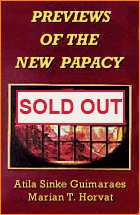Organic Society
 |
 |
 |
 |
 |
 |
 |
Regionalism & Cosmopolitism,
The People & the Masses
From the colorful, lively and kaleidoscopic texts of the great Antero de Figueiredo, a 20th century Portuguese writer, we want to comment today on another aspect of the fecund Catholic regionalism that characterizes the most profound realities of the Spanish nation.
*
“Along with the religious cult of historic relics,” observes the illustrious writer and efficient apostle of the Counter-Revolution, “there is (among the people of Navarre) an attachment to their special laws, open forums and privileges. It was the spirit of faith that caused them to come together in a public square in Pamplona [during the Spanish Civil War] to make a monument 'to symbolize the unity of the Navarrese in the defense of their liberties, liberties more worthy of love than life itself.'
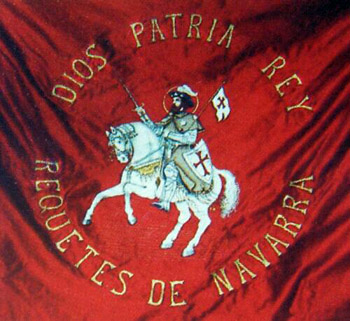
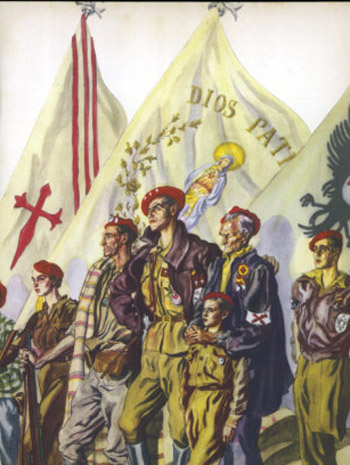 “Affirming once again their age-old privileges, they ordered the article from the Cortes of Olite of 1645 to be carved in stone on a pedestal that reads: 'The incorporation of Navarre to the crown of Castile was made by means of a special union in which each kingdom retains its ancient nature, in laws as well as territory and government.'
“Affirming once again their age-old privileges, they ordered the article from the Cortes of Olite of 1645 to be carved in stone on a pedestal that reads: 'The incorporation of Navarre to the crown of Castile was made by means of a special union in which each kingdom retains its ancient nature, in laws as well as territory and government.'
“On this symbolic monument, which affirms the solidarity of all the lands of this province represented by their various coats of arms, the Navarrese still exhibit, for present and future legislators, in both the Castilian and Basque languages, the sworn words of the ancient commitments of the Kings to the Navarrese people:
‘Our kings swear to guard and protect our privileges without breaking any of them, always improving them and never harming them, and that any transgression to this oath will be null, without effect or value’. …
“For these reasons, the Navarrese welcomed, more than all the others, with the deepest sympathy of its national soul, Carlism – the Conservative party par excellence preserving the old laws that had made those people of the hills and mountains so great and happy, conscious of their privileges, desiring only to live quietly in the peace of their national, Catholic and monarchical traditions, enjoying the benefits of the privileges to which they have hereditary rights. All this is contained in the motto of Carlos VIII: ”God, Country, King and Privileges.”
“The Navarre people – like the Biscayan, Galician and Catalan – are imbued with the regionalist notion that Spain should be a federative ensemble of homelands, formed not artificially by cold administrative departments but, to the contrary, by ardent natural groups with their ingrained ways of living, which together vibrantly profess in common the idea of a single nation, while using their own languages and customs, in the enjoyment of the full possession of the rights born from their local traditions and experiences. Thus, should they always live in admiration of and stimulated by the achievements of their forbearers, peoples who possess unique glorious pages of history, because they alone are the legitimate heirs of these local heroic lineages.
“If they do not have this, their instincts tell them that everything else is just artificial composites of men, quite different from the natural organic society, which (they believe in their naiveté!) started in the Iberian Peninsula with the unequal distribution of the lands: to some the mountain chain, to others the plains, to others the countryside, to yet others the coast lands. So, in this way the people became picturesquely different, aesthetically diverse, thus satisfying one of the conditions of beauty: variety.
“Hence Spain is a harmonious work of art made up of the many and different colors of each region, a unique rhythm that soars in a single melodic movement, reflecting the cadences of several different patterns. A nation, in a country of unequal peoples, languages, geographies, traditions, ways, customs and types of souls: It is a nation made up of solidarity in diversity, unity in differentiation.
“The political soul of an independent Navarre countryman is synthesized in the banner that, in 1936, in the agitated light of a province in alarm, waved feverishly in the streets of Pamplona at the head of a vociferous band of local patriots, who proclaimed their allegiance to local life and traditional freedoms in these two luminous words: Peace and Privileges!” (Espanha, 4th ed., pp 310-314).
*
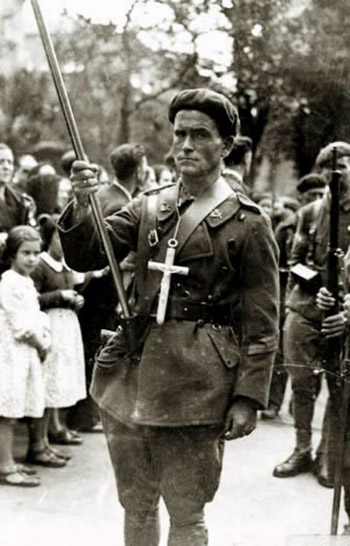 Describing with poetic grandeur the regionalist sense of Hispanic patriotism, the ”Ordenanza del Requeté” – an overview of the principles and duties of the Carlist “red berets” who fought to defend the Catholic Religion and oppose the Marxists in the Spanish Civil War – expresses its loyalty in these burning words:
Describing with poetic grandeur the regionalist sense of Hispanic patriotism, the ”Ordenanza del Requeté” – an overview of the principles and duties of the Carlist “red berets” who fought to defend the Catholic Religion and oppose the Marxists in the Spanish Civil War – expresses its loyalty in these burning words:
“Your Homeland is your Nation, your Nation, Spain.
“Spain – one and indivisible in its rich regional autarchic diversity – is:
- A sublime arcane of traditions;
- A reliquary of grandeur;
- Mother of the New Worlds;
- The Light of History;
- A Dwelling for Sanctity;
- Defender of the Catholic Church.
“Spain without the Cross would cease to be Spain.
“You must study her, to know her.
“Know her, to love her.
“Love her, to honor her.
“You must always remember that the purest of loves, after that of God, is love of Homeland..”
*
This organic regionalism that for about a millennium has applied the principle of solidarity to the relationships between the various “kingdoms” of the Iberian Peninsula and the large Hispanic Homeland subsists because, despite all the pressure of modern cosmopolitanism, authentic peoples still exist in Spain, unlike other nations where paganization and the dominion of money, the machine, propaganda and eroticism have transformed them into masses.
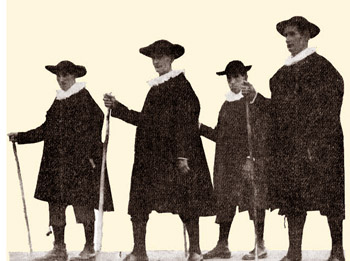
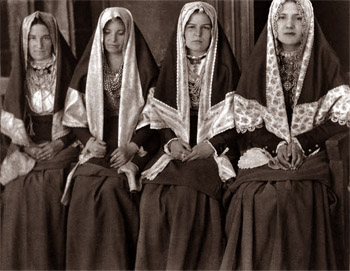 The Navarrese, whom the great Antero signals out particularly, received from the Church and her History a living tradition, which is independent from modern means of communication.
The Navarrese, whom the great Antero signals out particularly, received from the Church and her History a living tradition, which is independent from modern means of communication.
This tradition is preserved despite the pressure applied against it through these means. It is rooted deep in the soul of every genuine Navarre man and for him constitutes a personal conviction that, like his ancestors, he is disposed to defend with his blood.
In these serene mayors from the Valley of Aezcoa, brave and dignified, as a true Catholic must be, and in these modest yet refined young women [from the Roncal Valley] lives something authentic and genuine, simultaneously traditional and current, that all the influences of the Revolution have not managed to exterminate.
It offers a fecund hope for the radiant future promised by Our Lady at Fatima: the Reign of the Immaculate Heart of Mary, already announced in 1917 foreseeing the storms and catastrophes in which the Revolution will be humiliated and destroyed.
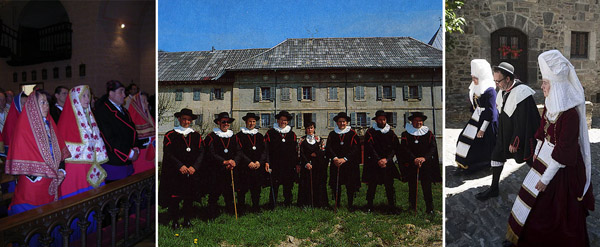

Catolicismo n. 166, October 1964
Posted July 27, 2016
“Along with the religious cult of historic relics,” observes the illustrious writer and efficient apostle of the Counter-Revolution, “there is (among the people of Navarre) an attachment to their special laws, open forums and privileges. It was the spirit of faith that caused them to come together in a public square in Pamplona [during the Spanish Civil War] to make a monument 'to symbolize the unity of the Navarrese in the defense of their liberties, liberties more worthy of love than life itself.'

A banner and a poster of Carlist requetés of Navarre

“On this symbolic monument, which affirms the solidarity of all the lands of this province represented by their various coats of arms, the Navarrese still exhibit, for present and future legislators, in both the Castilian and Basque languages, the sworn words of the ancient commitments of the Kings to the Navarrese people:
‘Our kings swear to guard and protect our privileges without breaking any of them, always improving them and never harming them, and that any transgression to this oath will be null, without effect or value’. …
“For these reasons, the Navarrese welcomed, more than all the others, with the deepest sympathy of its national soul, Carlism – the Conservative party par excellence preserving the old laws that had made those people of the hills and mountains so great and happy, conscious of their privileges, desiring only to live quietly in the peace of their national, Catholic and monarchical traditions, enjoying the benefits of the privileges to which they have hereditary rights. All this is contained in the motto of Carlos VIII: ”God, Country, King and Privileges.”
“The Navarre people – like the Biscayan, Galician and Catalan – are imbued with the regionalist notion that Spain should be a federative ensemble of homelands, formed not artificially by cold administrative departments but, to the contrary, by ardent natural groups with their ingrained ways of living, which together vibrantly profess in common the idea of a single nation, while using their own languages and customs, in the enjoyment of the full possession of the rights born from their local traditions and experiences. Thus, should they always live in admiration of and stimulated by the achievements of their forbearers, peoples who possess unique glorious pages of history, because they alone are the legitimate heirs of these local heroic lineages.
“If they do not have this, their instincts tell them that everything else is just artificial composites of men, quite different from the natural organic society, which (they believe in their naiveté!) started in the Iberian Peninsula with the unequal distribution of the lands: to some the mountain chain, to others the plains, to others the countryside, to yet others the coast lands. So, in this way the people became picturesquely different, aesthetically diverse, thus satisfying one of the conditions of beauty: variety.
“Hence Spain is a harmonious work of art made up of the many and different colors of each region, a unique rhythm that soars in a single melodic movement, reflecting the cadences of several different patterns. A nation, in a country of unequal peoples, languages, geographies, traditions, ways, customs and types of souls: It is a nation made up of solidarity in diversity, unity in differentiation.
“The political soul of an independent Navarre countryman is synthesized in the banner that, in 1936, in the agitated light of a province in alarm, waved feverishly in the streets of Pamplona at the head of a vociferous band of local patriots, who proclaimed their allegiance to local life and traditional freedoms in these two luminous words: Peace and Privileges!” (Espanha, 4th ed., pp 310-314).

A Carlist proudly wears the cross
“Your Homeland is your Nation, your Nation, Spain.
“Spain – one and indivisible in its rich regional autarchic diversity – is:
- A sublime arcane of traditions;
- A reliquary of grandeur;
- Mother of the New Worlds;
- The Light of History;
- A Dwelling for Sanctity;
- Defender of the Catholic Church.
“Spain without the Cross would cease to be Spain.
“You must study her, to know her.
“Know her, to love her.
“Love her, to honor her.
“You must always remember that the purest of loves, after that of God, is love of Homeland..”
This organic regionalism that for about a millennium has applied the principle of solidarity to the relationships between the various “kingdoms” of the Iberian Peninsula and the large Hispanic Homeland subsists because, despite all the pressure of modern cosmopolitanism, authentic peoples still exist in Spain, unlike other nations where paganization and the dominion of money, the machine, propaganda and eroticism have transformed them into masses.

Mayors of Navarre; below, women in traditional dress

This tradition is preserved despite the pressure applied against it through these means. It is rooted deep in the soul of every genuine Navarre man and for him constitutes a personal conviction that, like his ancestors, he is disposed to defend with his blood.
In these serene mayors from the Valley of Aezcoa, brave and dignified, as a true Catholic must be, and in these modest yet refined young women [from the Roncal Valley] lives something authentic and genuine, simultaneously traditional and current, that all the influences of the Revolution have not managed to exterminate.
It offers a fecund hope for the radiant future promised by Our Lady at Fatima: the Reign of the Immaculate Heart of Mary, already announced in 1917 foreseeing the storms and catastrophes in which the Revolution will be humiliated and destroyed.

Every year the peoples of the Roncal Valley parade wear traditional dress on a day set aside to celebrate their local customs
Watch the 2010 festivity here and here

Catolicismo n. 166, October 1964
Posted July 27, 2016
Organic Society was a theme dear to the late Prof. Plinio Corrêa de Oliveira. He addressed this topic on countless occasions during his life - at times in lectures for the formation of his disciples, at times in meetings with friends who gathered to study the social aspects and history of Christendom, at times just in passing.
Prof. Plinio
Atila S. Guimarães selected excerpts of these lectures and conversations from the transcripts of tapes and his own personal notes. He translated and adapted them into articles for the TIA website. In these texts fidelity to the original ideas and words is kept as much as possible.















